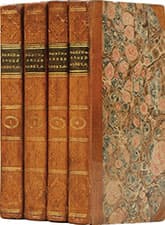Northanger Abbey
Critique • Quotes • At the movies
 Northanger Abbey and Persuasion in four volumes, 1818
Northanger Abbey and Persuasion in four volumes, 1818First publication
1817
Written
1794–1799, revised 1803
Literature form
Novel
Genres
Literary, satire, romance
Writing language
English
Author's country
England
Length
Approx. 78,000 words

Catherine (Katharine Schlesinger) is thrilled to be staying overnight at Northanger Abbey.
Sensation and suspicion
Northanger Abbey (1987): Film, 88 minutes; director Giles Foster; writer Maggie Wadey; featuring Katharine Schlesinger, Peter Firth, Robert Hardy, Googie Withers, Cassie Stuart, Jonathan Coy
In case the 1817 novel Northanger Abbey doesn't make clear Jane Austen is satirizing Gothic fiction, the 1987 adaptation hits you over the head with it. Repeatedly.
From the beginning of the film, Catherine Morland's reveries, encouraged by the sensationalist fiction she reads, are dramatized in dreamily dark romantic scenes. They verge on gruesome as Catherine fantasizes about being bound and slashed with knives. Some critics have been led to place this film in the horror category.
This may be justified as an updated but accurate interpretation of part of Austen's text. But because the rest of the novel is necessarily condensed to fit it all into an hour and a half, these fantasy sequences play a larger role than originally allotted. Northanger Abbey is one of Austen's least developed and least nuanced novels, but this adaptation has to skimp on even that.
And, to tell the truth, it works moderately well on the screen.
The little known English actress Katharine Schlesinger—in her mid-twenties with a wide-eyed, pixie appeal—is charming as the romanticizing Catherine of this film. She does less well as the maturing Catherine, who comes to realize the follies of her overactive imagination and finds true love. But this failure is mainly due to the screenplay running out before she can complete the transformation plausibly.
More experienced British actor Peter Firth, in his mid-thirties at the time, manages to be quite credible as the love interest, Henry Tilney. The trick he accomplishes is to convince us that his character of aristocratic heritage is smitten by the rather silly and—at times—annoying young woman.
Veteran actor Robert Hardy is solid as ever as his father, the supercilious General Tilney, ruler and possibly ruiner of Northanger Abbey, suspected of evil deeds by Catherine.
Henry's "greater civilization" speech to Catherine in Northanger Abbey.
They and the rest of the cast also suffer though from having curtailed parts. Whole subplots involving involving Catherine's family and the inhabitants of the foreboding castle they call an abbey are excised.
What we get of the story though is filmed sumptuously. Particularly fun are the scenes at Bath, where the upper crust soak and socialize in candle-lit pools, their gowns soaked up to their shoulders and food trays, I think they are, floating from their necks.
A number of abrupt cuts between scenes can make the film's pacing choppy at times and the ending comes too quickly. But the adaptation of Northanger Abbey is worth catching for a likable condensed reading of a Jane Austen near-classic.
— Eric

